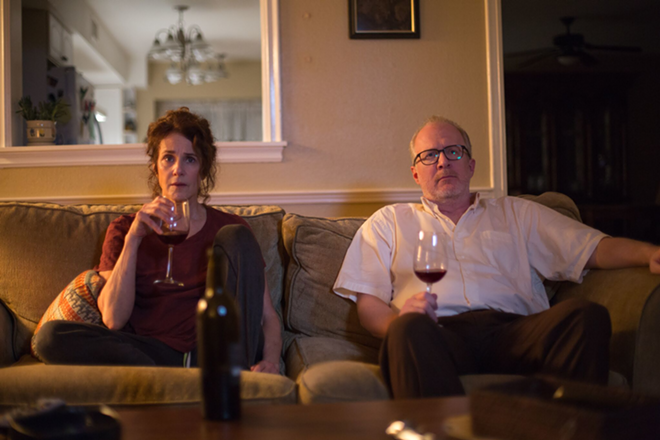Not so with most American films on adultery. With Azazel Jacob’s screenplay and direction of The Lovers, his movie on marital infidelity only stutters and sputters helplessly. There are occasional bright spots — more on that later — but ultimately it’s an unfocused and disappointing effort.
Though it's being marketed as a romantic comedy, it seems neither romantic nor loving, neither comic nor funny.
Michael (Tracy Letts) and Mary (Debra Winger), in their late 50’s, have long settled into a boring routine in their lives, both at work and at home, so each has taken a lover. With complicit permission and tolerance of the mutual dalliances, Michael hooks up with a vivacious ballet teacher Lucy (Melora Walters) and Mary turns to a considerably younger Irish writer Robert (Aidan Gillen). Both lovers are clingy and needy and borderline stalkers. Apparently it’s Michael and Mary’s intention to announce their impending official separation once their college son Joel (Tyler Ross) and his girlfriend Erin (Jessica Sula) come for the weekend, so all can move on to the next phase of their lives like modern adults. But love, or something, intervenes. Their own re-coupling or rediscovery of one another generates some warmth, hope even. But is it enough?
Read this next sentence slowly and carefully: This film makes us wonder whether a paying audience exists for a romantic comedy about a long married couple knowingly cheating on one another, each with a partner of his and her own — requiring four cellphones in nonstop use — who decide to rekindle their fading marital passion, thus necessitating a double betrayal in a turn-about-is-fair-play ploy by now having to cheat on the extra-curricular lovers.
It’s all a rather cheerless, dreary romantic entanglement that requires the balancing act of navigating marital (dis)bliss while armed with a Venn diagram, nautical depth chart, and telephone tree. No wonder everyone is perpetually exasperated and exhausted.
Why couldn’t the inestimable writer Nora Ephron have been part of this endeavor? I can only imagine her deft, acerbic touch she would have brought to the proceedings as husband and wife grow distant and dispassionate, not hostile, just blank, retreating into silence and staring into the middle distance, then surprisingly discovering there’s no place like home. Or do they?
And who knew duck on the Chinese take out menu could be so suggestive and catalytic?
The great pleasure of this film is watching Debra Winger and Tracy Letts work their magic with roles they seemed destined to play. They are consummate actors with their faces and their bodies, even their hesitations and their silences overcoming the deficiencies of plot and pacing. This is all the more remarkable considering Winger's long absence from the screen, prompting a 2002 documentary called Searching for Debra Winger (directed by Rosanna Arquette) all about the pressure on women in film who must juggle private and professional lives in ways unknown for male actors.
Both Winger and Letts are now of a certain age, and they imbue that world weariness and ennui as this husband and wife who share a long history but an increasingly unpredictable future. Both actors provide dozens of shaded gradations to their interior lives: the long wordless interludes, the stilted conversation, the starts and restarts to their dialogue, the banality of “we’re almost out of toothpaste” alongside the throwaway of “we messed up, but we’re not bad people”. You ache as they rekindle what seems to be genuine passion but soon discover it really is just one more step down that inevitable road of moving apart.
This film has a lush orchestral score, intrusive more often than not, by Mandy Hoffman. At first it seems intentionally ironic, playing against the realities of marital upheaval. Then it comes across as storybook cornball where we are to believe love conquers all if you just wait long enough.
As the film winds down after an ill-advised, over-the-top, histrionic scene with the adult son, there comes a piano solo of “It Must Be Love” played by Michael, a husband whose thwarted musical ambitions had been lost to the demands of work and family life. The melancholy song is sung by non-singer Tracy Letts, all the more poignant because of his untrained voice, underscoring the ambivalence and confusion that has seeped in a slow malaise over their marriage.
And in a coda, where all the reconfigurations are revealed in a flurry of boxing up books and china, the same song is sung again. This time it's in British songwriter-musician Labi Siffre's plaintive voice as he asks “How can we say so much without words?”
Bittersweet, but neither bitter nor sweet.


